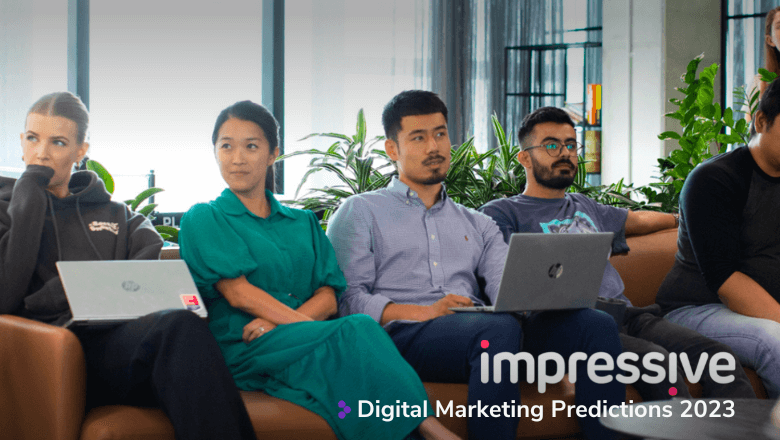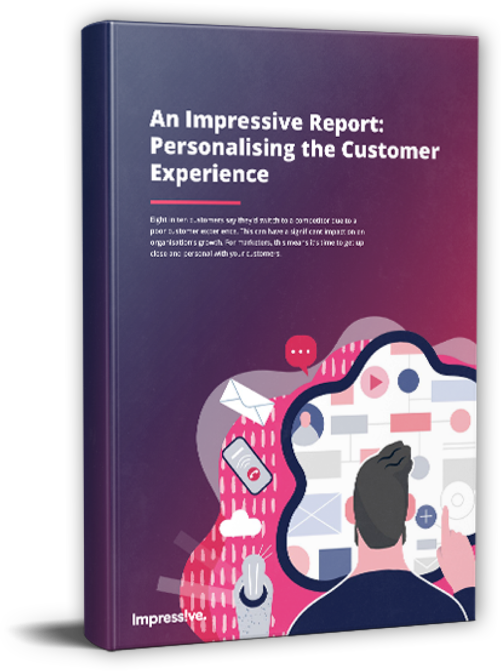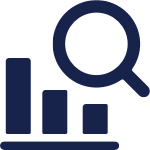At Impressive, we know firsthand how challenging it has been to navigate the rapidly changing business landscape during the global pandemic. As businesses and consumers adapt to the new marketplace and shift their approach to consuming information online, staying ahead of the curve and evolving alongside these changes is critical. We’ve spent some time looking at the latest trends to shape the digital marketing industry in the year ahead. Let’s dive in together and explore what’s on the horizon for 2023!
Greater Expectations for the Customer Experience
While product/service quality and affordability will be crucial factors that govern commerce choices, consumers also look for a memorable customer experience when visiting businesses’ web pages. Web interface technology has always been about maintaining and improving user friendliness and preventing user frustration, but nowadays, people want to be more engaged and entertained. Some of the things that brands are looking to deploy include:
- Online customer care portals
- Recommendation algorithms
- Integrated omnichannel support — as real-time, digital 3D interactions with customer care
All of this lends itself to an integrated metaverse customer service. More and more companies across all industries will also incorporate augmented reality (AR) and virtual reality (VR) in their digital marketing campaigns.
Greater Support for Socially Responsible Brands
Consumers are paying more attention to brands with integrity. 50% of Gen Zers and over 40% of millennials are more interested in supporting businesses that take stances on social issues such as LGBTQIA rights, gender/racial equality and inclusivity, and environmental sustainability. Sustainability practices will also be scrutinised in the context of brand marketing practices. The commitment to causes, however, must be genuine, not “purpose-washing,” as any goodwill perceived as self-serving could backfire. Brands and marketers should actively examine any inadvertent biases and topic exclusions and remedy these shortcomings in their marketing plans.
Strong Policies and Protections on Customer Privacy
The “weaponisation” of customer data by cybercriminals has made the effectiveness of businesses’ privacy protections a factor for many consumers when using brands. A brand’s ability to maintain the privacy of its customers will continue to be a deal breaker. Businesses that can provide a positive privacy experience — the ability of users to customise cookie settings or choose data retention time — will find that their ads perform better with their customers. Meanwhile, a poor privacy experience — improper handling of personal data, for example — is considered almost as bad as a privacy/data breach at the hands of a hacker. Brands will be more open to collecting their first-party data instead of resorting to third-party data collection and expand on consent-based data.
It’s All About Gen Z
Gen Z is the first generation with the distinction of growing up with the internet, and the focus on engagement will revolve around them. Their healthy disrespect for traditional advertising and a preference for authenticity has led to a continuing, rapid proliferation of influencer marketing, which is expected to grow to a value of US$21.1 billion in 2023. Because influencers are independent content creators who appear to offer followers honest reviews and product placement, they are perceived as more trustworthy than sponsored spokespeople. Still, as the power of influencer marketing grows in scope and awareness, followers will be on the lookout for transparency and authenticity.
With the evolution of influencer marketing has come a growing demand for short-form video and user-generated content (UGC) on channels like TikTok (with a predicted 800 million users in 2023), which, in turn, will further expand the reach of TikTok marketing. Around 70% of brands already believe that UGC helps them better connect with customers on social media — and UGC significantly impacts purchasing decisions. As such, there will be a focus on creative content production over traditional commercial messaging.
Automation and Performance Measurement
Automation, AI, and analytics will be more important than ever to support data tracking, developing performance measures, and achieving data-driven marketing objectives. First-party data platforms allow businesses to gather information to more effectively customise the customer experience while providing a better avenue to maintain customer privacy and prevent data breaches. Algorithms measure engagement and assess search results. AI will even play a significant role in identifying the most effective candidates for influencer marketing partnerships. Marketing automation streamlines workflows, assists with lead generation, and can send customised, follow-up emails to customers with the right call to action, resulting in a marked boost in revenue and customer engagement. More marketers will also deploy chatbots and digital assistants to better engage with customers.
An Impressive Digital Marketing Strategy for 2023
As we gear up for 2023, the world of digital media is undergoing a significant shift. Gen Z is seeking more authenticity, shorter video content, and a focus on social responsibility over manipulative advertising and profit-driven tactics. Customers are also increasingly concerned about their privacy and expect an exceptional customer experience.
At Impressive, we understand these changing dynamics and are here to help you stay ahead of the game. With our expertise in automation and analytics, we can provide insights into how your digital marketing strategy is performing and help you better connect with your target audience. Let us help you increase your views, followers, and conversions with a tailored digital marketing plan. Contact us today and take the first step towards elevating your online presence and growing your business. Best of all, get your free Impressive marketing plan when you do!






